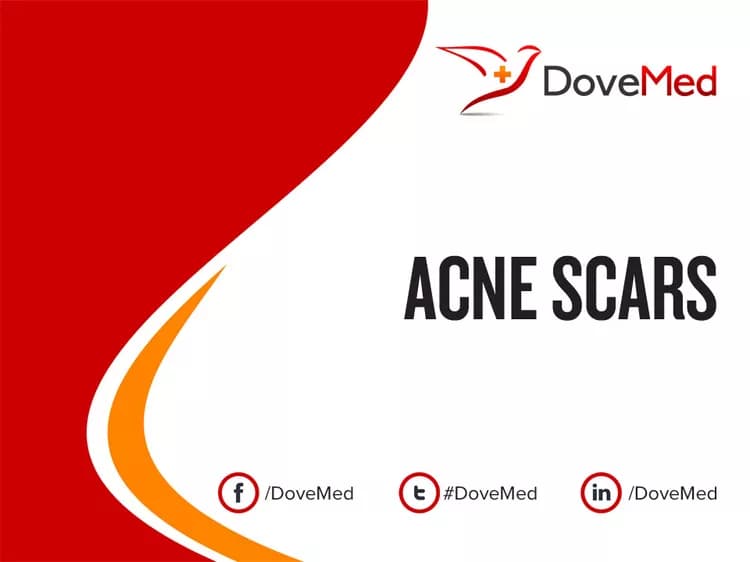What are the other Names for this Condition? (Also known as/Synonyms)
- Acne Scarring
- Scarring due to Acne
What is Acne Scars? (Definition/Background Information)
- Acne is a common skin condition that causes inflamed red spots/lesions to appear on the face, neck, shoulders, and other regions. The condition occurs when the tiny pilosebaceous follicles become clogged with dead cells and oil
- Acne Scars develop as a result of severe forms of acne, which may include acne conglobata, acne fulminans, and excoriated acne, and/or due to non-treatment of acne
- Depending on the severity of the condition, Acne Scars may be treated with dermabrasion, laser therapy, and surgical excision and removal; in the case of large scars
- The prognosis of Acne Scars is generally good with adequate treatment, although severe scars can be permanent and/or may require more intensive treatment
Who gets Acne Scars? (Age and Sex Distribution)
- Acne Scars may be seen in a wide age range of individuals affecting both children and adults
- Both males and females are affected, but the condition is more common in females
- There is no racial or ethnic predilection
What are the Risk Factors for Acne Scars? (Predisposing Factors)
The risk factors for Acne Scars include:
- Acne conglobata
- Acne fulminans
- Picking or scratching of acne skin lesions in acne excoreie
- Infection of acne lesions
- Improper or inadequate treatment of acne
- Any individual with severe acne may be at risk
It is important to note that having a risk factor does not mean that one will get the condition. A risk factor increases one's chances of getting a condition compared to an individual without the risk factors. Some risk factors are more important than others.
Also, not having a risk factor does not mean that an individual will not get the condition. It is always important to discuss the effect of risk factors with your healthcare provider.
What are the Causes of Acne Scars? (Etiology)
Acne Scars are the result of aggravated or severe acne that occurs due to a variety of factors. These may include the following:
- Worsening of existing acne
- Severe infection of existing acne
- Delayed or a lack of treatment
- Some variants of acne, such as acne fulminans and acne conglobata, are more severe in their manifestation
- Subjecting the acne lesions to physical trauma, such as by scratching, picking, or squeezing them, leading to the development of excoriated acne
What are the Signs and Symptoms of Acne Scars?
The signs and symptoms of Acne Scars are as follows:
- Pitting and scarring of the skin
- The skin over the scars may be hyperpigmented or hypopigmented
- The face, neck, shoulders, and arms may be affected
- Severe emotional distress and embarrassment
How is Acne Scars Diagnosed?
- Acne Scars may be diagnosed through a simple physical examination, by the physician or dermatologist, and medical history evaluation
- Invasive methods, such as skin biopsy, are typically not required; a diagnosis can be made through a physical examination itself
Many clinical conditions may have similar signs and symptoms. Your healthcare provider may perform additional tests to rule out other clinical conditions to arrive at a definitive diagnosis.
What are the possible Complications of Acne Scars?
Some of the complications of Acne Scars include:
- Cosmetic disfigurement and permanent scarring - cosmetic surgery may be required to remove such scars and marks in some cases
- Increased or severe psychological stress
How is Acne Scars Treated?
The treatment measures for Acne Scars are dependent upon the severity of the skin condition. These measures are outlined below:
- Use of certain topical steroid applications may be rarely helpful
- Under local anesthesia, a cosmetic procedure called dermabrasion is performed. In this procedure, the raised lumpy acne scars and dark skin spots are abraded (rubbed-off)
- Use of cosmetic procedures, such as chemical peeling, minor skin surgery (punch excision), and microdermabrasion
- Laser therapy
- Surgical removal of large scars may be undertaken
- Undertaking early and suitable treatment of acne (including the variants of acne)
How can Acne Scars be Prevented?
Acne Scars can be prevented through the following measures:
- Providing suitable or adequate treatment of acne
- Avoiding factors that tend to aggravate an existing acne
- Avoiding picking or scratching of acne skin lesions
- Undertaking early treatment of acne conglobata and acne fulminans
- Immediately treating any infection of acne skin lesions
- Undertaking appropriate treatment of mental health conditions that may help in arresting further aggravation of acne excoriée
What is the Prognosis of Acne Scars? (Outcomes/Resolutions)
- The prognosis of Acne Scars depends on the severity of the signs and symptoms and the underlying cause for the scars. In general, the prognosis is good with proper treatment
- Mild cases that may be treated completely have a lower risk for permanent scarring than severe acne conditions
- Severe Acne Scarring can lead to permanent facial or skin disfigurement resulting in emotional trauma, stress, reduced self-esteem, and more intensive treatment
Additional and Relevant Useful Information for Acne Scars:
Cleaning the skin too hard with strong chemicals or soaps may aggravate the skin condition.
Related Articles
Test Your Knowledge
Asked by users
Related Centers
Related Specialties
Related Physicians
Related Procedures
Related Resources
Join DoveHubs
and connect with fellow professionals



0 Comments
Please log in to post a comment.